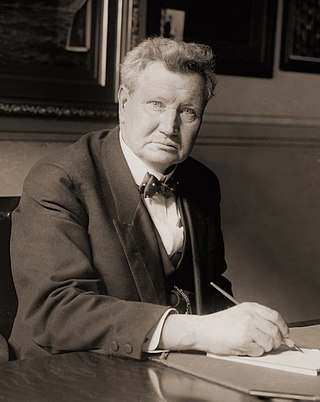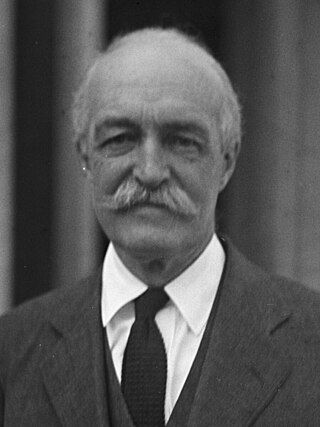
Gifford Pinchot was an American forester and politician. He served as the fourth chief of the U.S. Division of Forestry, as the first head of the United States Forest Service, and as the 28th governor of Pennsylvania. He was a member of the Republican Party for most of his life, though he joined the Progressive Party for a brief period.

William Bauchop Wilson was an American labor leader and progressive politician, who immigrated as a child with his family from Lanarkshire, Scotland. After having worked as a child and adult in the coal mines of Pennsylvania, he became active as a labor organizer.

Arthur Horace James was an American lawyer, politician, and judge. A Republican, he served as the 14th lieutenant governor (1927–1931) and the 31st governor (1939–1943) of Pennsylvania.

William Scott Vare was an American politician from Pennsylvania who served as a Republican member of the United States House of Representatives for Pennsylvania's 1st congressional district from 1912 to 1927. He also served as a member of the Pennsylvania State Senate from the 1st Senatorial District from 1922 to 1923. He won election to the United States Senate for Pennsylvania in 1926 but was never seated and was eventually removed in 1929 due to allegations of corruption and voter fraud.

George Wharton Pepper was an American lawyer, law professor at the University of Pennsylvania Law School, Christian activist, and Republican politician from Philadelphia, Pennsylvania. He represented Pennsylvania in the United States Senate, and founded the law firm of Pepper Hamilton.

Francis John Myers was an American teacher, lawyer, and Democratic Party politician. He represented most of West Philadelphia and Southwest Philadelphia in the United States House of Representatives from 1939 to 1945 and represented Pennsylvania in the United States Senate for one term from 1945 to 1951. He was Senate Majority Whip from 1949 to 1951.

The 1794–95 United States Senate elections were held on various dates in various states. As these U.S. Senate elections were prior to the ratification of the Seventeenth Amendment in 1913, senators were chosen by state legislatures. Senators were elected over a wide range of time throughout 1794 and 1795, and a seat may have been filled months late or remained vacant due to legislative deadlock. In these elections, terms were up for the senators in Class 3.

The 1914 United States Senate election in Pennsylvania was held on November 3, 1914. Incumbent Republican U.S. Senator Boies Penrose won re-election against Gifford Pinchot and A. Mitchell Palmer.

The United States Senate election of 1930 in Massachusetts was held on November 4, 1930. Incumbent Republican Senator Frederick H. Gillett did not run for re-election. In the open race to succeed him, Democratic Mayor of Fitchburg Marcus A. Coolidge defeated former U.S. Senator William M. Butler.

Harry Arista Mackey was an American college football player and coach, lawyer, and politician. He served as the mayor of Philadelphia from 1928 to 1932.

The 1930 United States Senate special election in Pennsylvania was held on November 4, 1930. Joseph R. Grundy, incumbent Republican appointed to fill the vacancy created by the unseating of William Scott Vare, was defeated for re-nomination. The Republican nominee, James J. Davis, defeated Democratic nominee Sedgwick Kistler to win the election.

The 1934 United States Senate election in Pennsylvania was held on November 6, 1934. Incumbent Republican U.S. Senator David A. Reed sought re-election to another term, but was defeated by Democratic nominee Joseph F. Guffey.

The 1922 United States Senate special election in Pennsylvania was held on November 7, 1922. Incumbent Republican Senator George Pepper, who had been appointed to the seat by Governor William Sproul following the death of Boies Penrose, was elected to fill the remaining four years on the term to which Penrose had been elected in 1920. Pepper comfortably defeated five other candidates, including Democratic nominee Fred Kerr of Clearfield County.

The 1930 Pennsylvania gubernatorial election occurred on November 4, 1930. Incumbent Republican governor John Stuchell Fisher was not a candidate for re-election. Republican candidate and former governor Gifford Pinchot defeated Democratic candidate John M. Hemphill to win a second, non-consecutive term as Governor of Pennsylvania.

The 1934 Pennsylvania gubernatorial election occurred on November 6, 1934. Incumbent Republican governor Gifford Pinchot was not a candidate for re-election.

Francis Shunk Brown was an American lawyer from Pennsylvania who served one term as Pennsylvania Attorney General from 1915 to 1919 and ran unsuccessfully in the Republican primary for Governor in 1930.

The 1911 Philadelphia mayoral election saw the election of Rudolph Blankenburg.

The 2024 United States Senate election in Pennsylvania will be held on November 5, 2024, to elect a member of the United States Senate to represent the state of Pennsylvania. Primary elections will take place on April 23, 2024. Incumbent three-term Democratic Senator Bob Casey Jr. announced his intention to run for a fourth term on April 10, 2023.

Cornelia Elizabeth Bryce Pinchot, also known as “Leila Pinchot,” was a 20th-century American conservationist, Progressive politician, and women’s rights activist. She was the wife of Gifford Pinchot (1865-1946), the renowned conservationist and two-time Governor of the Commonwealth of Pennsylvania, and was also a close friend of U.S. President Theodore Roosevelt. She was the maternal great-granddaughter of Peter Cooper, founder of Cooper Union, and daughter of U.S. Congressman and Envoy Lloyd Stephens Bryce (1851–1917). She played a key role in the improvement of Grey Towers, the Pinchot family estate in Milford, Pennsylvania, which was donated to the U.S. Forest Service in 1963 and then designated as a National Historic Landmark in 1966




















